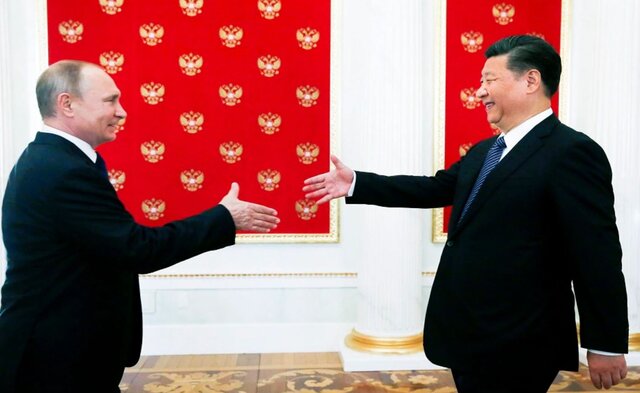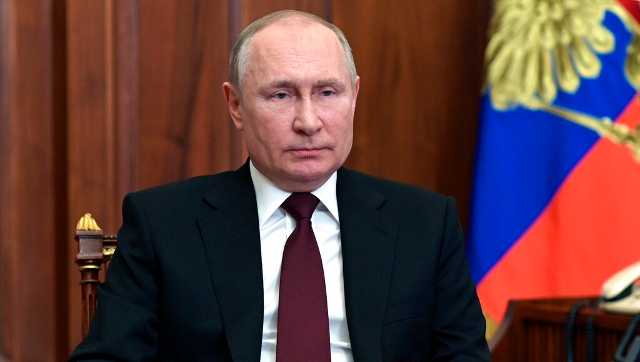After months of tense drama over the massing of Russian troops on Ukraine’s border, President Vladimir Putin launched a “special military operation” in that country. He defined its objectives as “demilitarising” and “de-Nazifying” that country. The first objective translated to dismantling or destroying military capacities allegedly established by NATO. The second, more nebulous, apparently meant ridding the country of “neo-Nazi” Russophobes, who have allegedly discriminated against and grossly ill-treated (he has called it genocide) ethnic Russians in Ukraine. This war has already caused civilian deaths and mass displacement, and the Russians have not made the rapid military progress they expected. A resolution, condemning the Russian invasion, did not pass in the recent emergency meeting of the United Nations Security Council, because Russia exercised its veto. At the meeting, India stressed the importance of sovereignty and territorial integrity and urged a return to diplomacy and dialogue, but abstained in the vote. This has drawn criticism from some quarters at home and abroad, for sacrificing morality and legality at the altar of pragmatism. Putting aside, for a moment, questions of morality, legality and pragmatism, the issues at stake are worth reviewing. Ironically, the first act of this drama commenced with a meeting between the Presidents of the US and Russia in June last year, when they agreed to work for “stable and predictable” bilateral relations. After seven years of Cold War-like acrimony, involving confrontation — directly or through proxies — across geographies in Europe and Asia, this foreshadowed a calibration of US policy. President Joe Biden signalled that the US would like to shift its foreign policy focus to the strategic challenges posed by China. This meant cooperating with Russia to resolve global problems — Ukraine, Iran, Libya, Syria, Yemen and Afghanistan were a few on a long list. Russia appreciated this outreach, since the standoff with the US and Europe had increased its dependence on China, constrained the flows of investments and technologies from Europe, and forced it into an expensive militarisation programme, in response to the NATO arms build-up along its land and maritime periphery. But President Putin also indicated that Russia’s security concerns about NATO’s actions and strategic posture need to be addressed, for the cooperation to be sustainable. [caption id=“attachment_10389741” align=“alignnone” width=“640”]  File image of Russian president Vladimir Putin and his Chinese counterpart Xi Jinping in Moscow. AP[/caption] There were bilateral discussions on these concerns in the months following the June summit. Despite the usual posturing on both sides, reasonable progress was seemingly being made on measures for Russia and NATO to moderate their strategic postures — reducing the range and lethality of weapons systems aimed at each other, moratoriums on missile deployments and other confidence-building measures.
***
Also Read **Russia-Ukraine crisis: Here's what will get more expensive in India if two countries go to war** **The meta-narrative about India’s non-involvement in the Ukraine imbroglio** **India’s abstinence from UN Security Council vote on Ukraine was the right decision** **If situation deteriorates in Ukraine, India’s defence deals with Russia will face more scrutiny: Harsh V Pant** **Ukraine crisis sinks Indian markets, set to hit bilateral trade with Kyiv** **How Ukraine crisis marks return of Russia as a global geopolitical player** **Vladimir Putin plays Ukraine card well, but will the West bend and accept his demands?** **Why does Russia want Ukraine so badly? Here’s what a geography book tells us** **Ukraine crisis: Taking sides will harm India’s national interests** **Ukraine should realise the folly of NATO tilt and resume talks with Putin’s Russia** **Vladimir Putin draws redline for NATO: No eastward expansion towards Ukraine** **How Vladimir Putin’s Ukraine stunt stuns Germany and disrupts its economic dreams** **Why vested interests are hell-bent on dragging India into a distant conflict in Ukraine** **Ukraine crisis: How confrontation between Putin’s Russia and Biden-led West will impact India’s foreign relations**
***
But the core issue of Ukraine remained unresolved. From the security point of view, the porous Russia-Ukraine border is militarily vulnerable; over the centuries, it has been the route of invasions into Russia from the West. From a strategic perspective, the Crimean Black Sea port of Sevastopol houses Russia’s naval fleet. It is Russia’s only all-weather port — an essential asset for projection of maritime power. Russia could not, therefore, countenance the possibility of Ukraine joining NATO or of NATO military installations in Ukraine. US pressure on NATO in 2008 to recognise Ukraine’s membership aspirations and its encouragement for a change of government in Kyiv in 2014, provoked the first Russian intervention in Ukraine when it stage-managed a referendum, after which Crimea (which has a majority of Russian-speaking people) acceded to Russia. Separatist groups captured territories in eastern Ukraine (Donbas), which are also dominated by Russian-speakers, and declared two independent republics. France and Germany brokered a peace agreement — the Minsk accords — which provided for special autonomy for this region. Ukraine has been unhappy with this outcome. The US (and some European countries) supported its efforts to reinterpret the terms of the accords. In bilateral discussions after the June summit, the US reportedly indicated to Russia that it would now support the full implementation of the Minsk accords. Nevertheless, progress was not made. This may have convinced Putin that negotiations would not deliver the satisfaction of Russia’s demands on this matter. The US and its NATO allies have announced a strong slate of sanctions on trade and other financial transactions with Russia. They may have a devastating impact on the Russian economy in the long run, but will also immediately hurt Western economies, because of their dependence on Russian oil and gas. Europe imports about 40 per cent of its gas and a quarter of its oil from Russia. A diversification of supplies can only be a medium-term enterprise. There will be pressure on India to join the sanctions, reversing its stand that it only recognizes sanctions collectively authorized by the UN. If the Russian actions continue for much longer, this pressure will become stronger. Even otherwise, since there will be restrictions on transfers of major currencies — dollar, euro and yen — financial transactions with Russia will have to be structured differently. [caption id=“attachment_9248211” align=“alignnone” width=“640”]  US dollars. Image courtesy Jericho/Wikimedia Commons[/caption] We already have experience with this, since some form of these sanctions have already existed since 2014. India’s defence cooperation with Russia will come under pressure, with intensified threats of the US legislation, CAATSA, which provides for sanctions on any company entering into a major defence transaction with Russia. India will have to walk very carefully on this tight rope. Of course, all these sanctions have a lead period for coming into force. If hostilities cease and an agreement is reached before then, these disruptions could be averted. Returning to the question of morality and legality, there can be no two views that the Russian action is a contravention of international law. This war, by whatever name, cannot be described as moral, whatever the given justification. At the same time, two points should be noted. Every major power — contemporary and in history — has had no compunction about embarking on immoral and illegal action, when it believes it is in its national interest or that its security is at stake. To quote one example, the United States invaded Iraq in 2003 on what turned out to be a false allegation of weapons of mass destruction there, resulting in major damage to life and property. Then too, India resisted pressures to condemn the US action. Our Parliament’s resolution criticised it but stopped short of condemning it. The second point is about foreign countries telling us that calling for restraint from both sides is unacceptable because it equates the aggressor with the victim. This is so, but Indian diplomats remember that this is precisely how many powers reacted in the past when Pakistan carried out major cross-border terrorist acts in India. Pakistan’s assistance was important to them in the “war on terror”, and so they were careful about criticising it. They should now understand the same logic of pragmatism in India’s vote in the Security Council. This crisis is not of India’s making. Though an invasion is an extreme act, the actions of all the stakeholders over the years have created this situation of breakdown of diplomacy. India has excellent relations with all the actors in this tragic drama: The US, Russia, European countries and Ukraine. It can only urge them to return to the sanity of mutual accommodation, as it did at the UN. Condemning one to please the others does not achieve anything. Whatever the contours of resolution of this war, the mutuality of India’s interests with all these partners will remain important. The writer is a former Ambassador to Russia, now Distinguished Fellow, Vivekananda International Foundation, New Delhi. Views expressed are personal. Read all the Latest News , Trending News , Cricket News , Bollywood News , India News and Entertainment News here. Follow us on Facebook, Twitter and Instagram.


)

)
)
)
)
)
)
)
)



